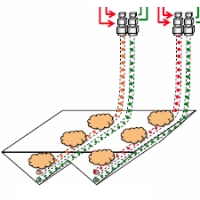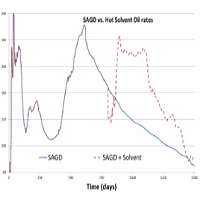Leading indicators in the battle for the future of bitumen recovery
 What will be the future for the battle of bitumen recovery? AppIntel AI has the leading indicators for this battle. Will injectants be methane, propane, or CO2? Primary or thermal? SAGD or CSS? Will surfactant make a big difference?
What will be the future for the battle of bitumen recovery? AppIntel AI has the leading indicators for this battle. Will injectants be methane, propane, or CO2? Primary or thermal? SAGD or CSS? Will surfactant make a big difference?
Without AppIntel how would you stay abreast of the next bitumen development strategies? With AppIntel AI you get the leading indicators on early advances in this field. Just type into the AppIntel KiP box bitumen development 2024 to get advances from the most recent field trials.
One operator is expanding her scheme and adding cavern mining for storage of plant effluent and fines. Too bad her plans were rejected by the picky regulator on a technicality.
Get her application documents from our self-serve portal.
Buy these submission docs now Subscribers get them for freeLeading indicators
Statisticians say a leading indicator is a measurable factor that precedes a change in the economy.
For example, building permits are a leading indicator of construction activity. If building permits are up in a month, it likely means that construction activity will increase over the next few months. If construction activity will increase, so will labor, purchase of construction materials and other spending that goes with construction.
Regulatory applications are leading indicators of future industry activity
Just like economic leading indicators, regulatory application submissions are a leading indicator of oil and gas activity. Applications are always submitted before any oil and gas work happens on the ground.
Before a company drills a well, it submits an application. Before an operator injects water in the ground she submits an application. Before an oil company builds or modifies a gas plant -- an application.
Oil and gas leading indicator examples
When applications are up over last month, it usually means increased industry activity will follow.
When well licence applications increase, more wells will be drilled in the next twelve months.
When down-spacing or holding applications ramp up, that's even an earlier indicator that those applicants will be drilling more wells over the next two years.
When pipeline licence applications spike, more pipelines will be laid over the next few quarters.
When more oil sands commercial scheme applications are registered, more oil sand related construction will occur over the next five years.
?subject=Help me get up to speed on thermal surveillance wells&body=Help me get up to speed on thermal surveillance wells. Show me different operator's opinions from their applications.%0D%0A%0D%0AMy Name:__________ %0D%0AMy Phone Number:__________ %0D%0A%0D%0A(Or call Proven Sales at 403-803-2500.)">Contact Proven for recent developments. We stay on top of thermal recovery strategies.
Applications are leading indicators of future industry activity.
Applications are the first place you'll see new oil and gas technology installed at the field level. Before any new technology is tried in the field, an application must be approved.
Advances fill the pages of regulatory applications every day. All the advances are all ground truthed to a physical location.
Your competitors are using new technology to reduce cost and improve recovery. If you think they will tell you their trade secrets, dream on. The only way you will discover their advances is by reading their applications.
You need to know what your competitors are planning – not just what they’re telling the investment community.
Adjudication by the picky regulator
All applications are reviewed by a picky regulator. Upon submission, the regulator asks many questions to dig deep about new technology. All that investigation is included in the application.
Questions and Supplemental information Requests (SIRs) are designed by the regulator to investigate the merits of the technology applied in the proposed operation.
Applications are an exposé of practical technology use.
Applications show how technology works out in the field.
They indicate success and failure of each type of technology.
They even offer ways to conduct look-back analysis on technology installations.
Applications also broadcast the pessimism (or optimism) of an operator.
They indicate the operator's short and long term plans.
The best way to stay on top of oil field technology is to watch applications.
How can you be ready for anything? You need to be watching what other operators are doing.
?subject=Help me get up to speed on new thermal projects.&body=Help me get up to speed on new thermal projects.%0D%0A%0D%0AMy Name:__________ %0D%0AMy Phone Number:__________ %0D%0A%0D%0A(Or call Proven Sales at 403-803-2500.)">Contact Proven for support. We watch the leading indicators of the industry.
Leading indicators of thermal technology
You can't keep up with bitumen thermal technology by going to conferences. The technology changes way too quickly. Operators don't allow their employees to publish early results in technical journals.
The best way to keep up with technology is to watch applications. Each application is full of technology results and future plans.
Every morning, you can receive an alert on new applications submitted close to you the day before, right to your email in-basket.
Leading Indicators in AppIntel
The regulatory application documents upon which AppIntel AI is trained are leading indicators: An application is argued before any action happens in the field. The information is the most current you will find anywhere. A year fresher than technical papers. Years more current than university classes. A decade more current than textbooks.
AppIntel is the only way to watch these trends.
Future of bitumen recovery
Which of these will prove to be the most cost effective recovery tool for bitumen? Some operators are experimenting with each in the same field.
All these have been passed the theoretical phase and lab test phase. Each has been implemented in the field.
?subject=Help me with solvent SAGD best practices&body=Please help me with solvent SAGD best practices. %0D%0A%0D%0AMy Name:__________ %0D%0AMy Phone Number:__________ %0D%0A%0D%0A(Or call Proven Sales at 403-803-2500.)">Contact Proven for support. We stay on top of best practices from applications.
Primary recovery
Some operators are falling back to primary recovery upon deciding that enhanced recovery isn't economic. For the right bitumen viscosity, some operators are able to produce oil without any injectant.
Progressive Cavity Pumps (PCP) are often used for primary recovery. Primary bitumen production usually produces 3-5% recovery, but some installations claim up to 12%.
Sometimes sand is produced with the bitumen. Using Cold Flow or Cold Heavy Oil Production with Sand (CHOPS) up to 50% of the production can be sand.
Just add steam
Steam, soak, suck it back. Cyclical Steam Stimulation (CSS) or "huff and puff" introduces steam into a bitumen reservoir as a stimulation treatment.
Recently many operators have been using horizontal wells in their CSS schemes.
?subject=Help me with CSS best practices&body=Please help me with CSS best practices. %0D%0A%0D%0AMy Name:__________ %0D%0AMy Phone Number:__________ %0D%0A%0D%0A(Or call Proven Sales at 403-803-2500.)">Contact Proven for support. We stay on top of best practices from applications.
Steam Assisted Gravity Drainage
SAGD has become very popular. Rather than injecting and producing from the same well bore as in CSS, a horizontal injector is placed very near a horizontal producer.
Steam injected melts the bitumen which is produced by the producing well.
Steam Additive - Methane
 In addition to steam, some operators are adding methane. Since methane doesn't condense at reservoir conditions, it helps maintain injection volume introduced by the steam. Steam rate can be reduced and production still stays high.
In addition to steam, some operators are adding methane. Since methane doesn't condense at reservoir conditions, it helps maintain injection volume introduced by the steam. Steam rate can be reduced and production still stays high.
Methane injection can reduce the cost of steam injection, one of the largest operating costs of SAGD.
Methane injection has become very popular with SAGD operators, but very few CSS operators are trying it.
Steam and Propane co-injection
 One operator is a proponent for injecting propane into his thermal operation. On top of saving steam generation costs, water processing and disposal costs, he believes he will generate 25% more bitumen recovery.
One operator is a proponent for injecting propane into his thermal operation. On top of saving steam generation costs, water processing and disposal costs, he believes he will generate 25% more bitumen recovery.
And later, you can produce all your propane back for resale.
The propane injected absorbs into the bitumen and reduces viscosity. Additional recovery is the result.
Adding surfactant
 Some operators are injecting surfactant into their thermal schemes. Some hope to heal hot spots that short-circuit injector and producer paths.
Some operators are injecting surfactant into their thermal schemes. Some hope to heal hot spots that short-circuit injector and producer paths.
Other operators hope for additional recovery using surfactant.
?subject=I want a one day trial of AppIntel&body=Sign me up for a one day AppIntel trial so I can search quickly for all the solvent SAGD applications.%0D%0A%0D%0AMy Name:___%0D%0AMy Phone Number:____%0D%0A%0D%0AType of applications:___%0D%0A%0D%0APricing: https://www1.appintel.info/short-term-search/%0D%0A%0D%0A(Or call AppIntel Sales at 403-803-2500.)">Contact us now for a one day trial.
Tags: Thermal, AppIntel advantage, Heavy Oil
 Granger Low 3 Jun 2024
Granger Low 3 Jun 2024

How do you choose an AI?
AI selection criteria

Too busy to use oil and gas AI?
Then you are too busy to add oil and gas production quickly

Energy industry badly needs AI for growth
But chatbots are giving AI a bad name

Pacify the picky regulator
They want all the details

The paradigm shift your competition hopes you ignore
How will you keep up with a once-in-a-generation investment opportunity?

LLM more trendy than LNG?
Large Language Model for oil and gas

How do we train the millennial oil and gas knowledge worker?
How will they stay current? How will they add more oil and gas?

Prevent SAGD Breakthrough
And see his net pay maps

The shortcut that could end your career and your company
Don’t start or optimize secondary recovery without expert help

Oil and gas will not tolerate AI hallucinations
AI for the industry must be trustworthy

Making more oil in a world where AI accelerates change like never before
Flooding the tight Montney

AI helps Oil and Gas be wiser than Solomon
AI based in truth, not pop culture

Mitigating Induced Seismicity – Calm on the surface
Not shaken. Not even stirred.

Yogi vs. Granger - AI impediments to resolve for AI success in oil and gas
Yogi Schulz and Granger Low face off over AI adoption

Amid tariff uncertainty, Canadian well applications grow again
AppIntel AI leading indicators suggest operator optimism

AppIntel AI blog has delivered over 1 million pages views
Artificial Intelligence for the oil and gas industry

Getting flexibility in plant sulfur emissions
Sometimes it's all in the math

Haters know something you don't
Using the regulator to bully and save $3 million

Smartest hacks to make exploring much more rewarding
Exploration intelligence you can milk from industry submissions

Five impediments to adopting oil and gas artificial intelligence
How to keep up with innovation

Quickly copy industry successes
Add $20 million in extra NAV like this user






 Calgary, Alberta, Canada
Calgary, Alberta, Canada Share
Share